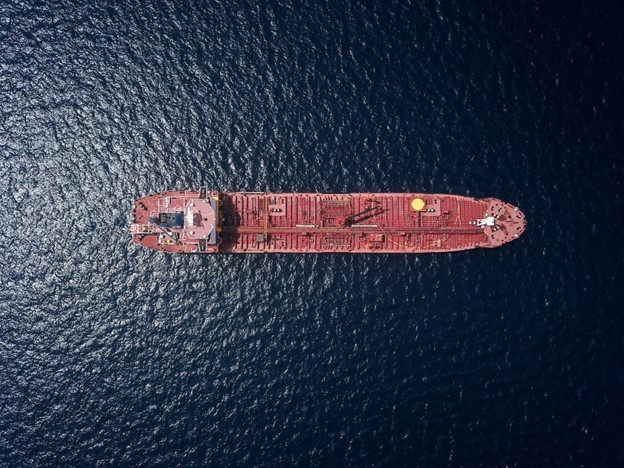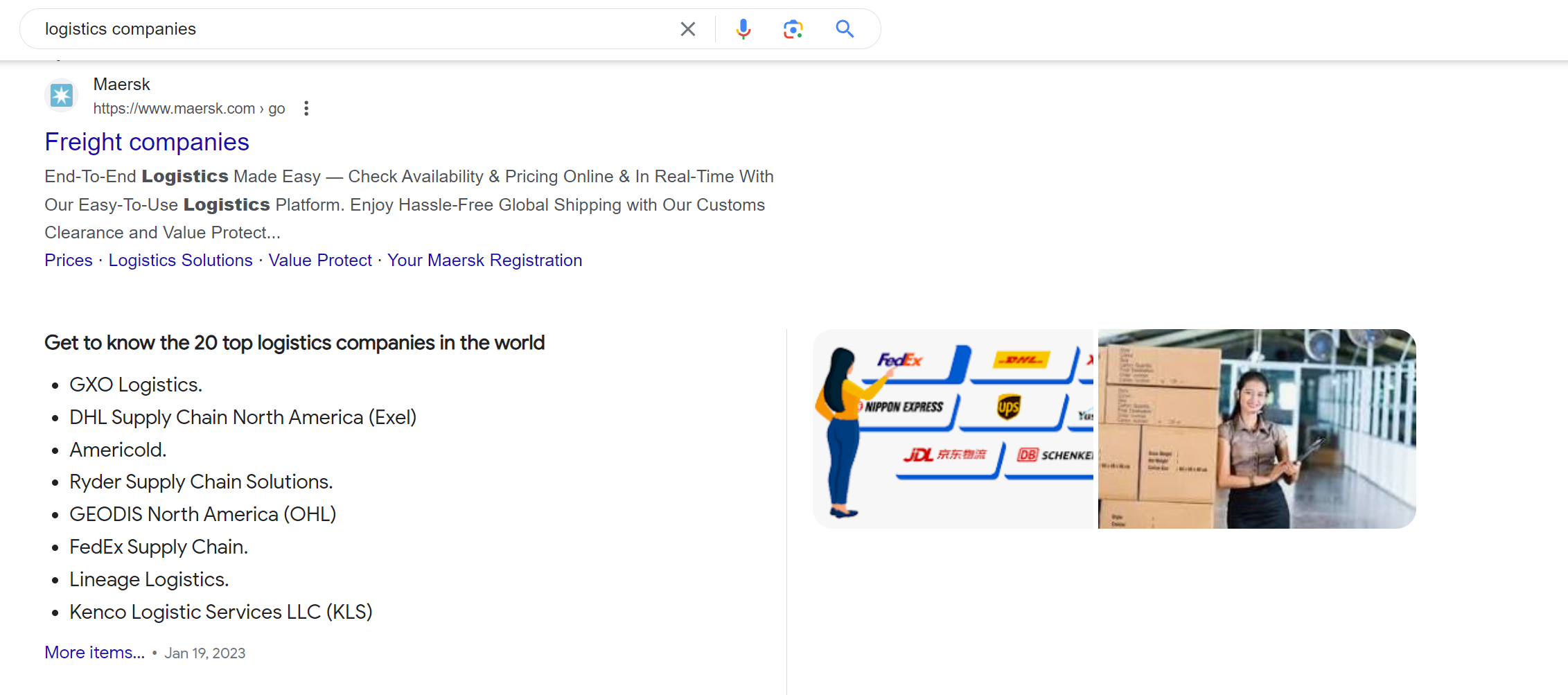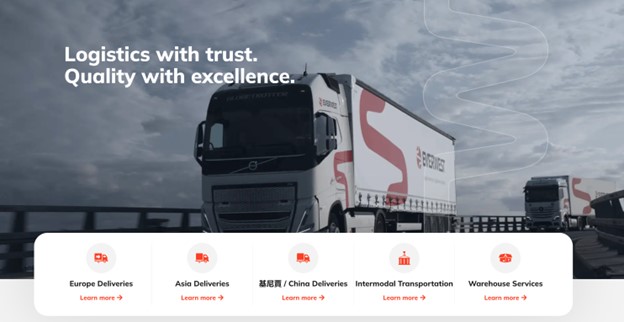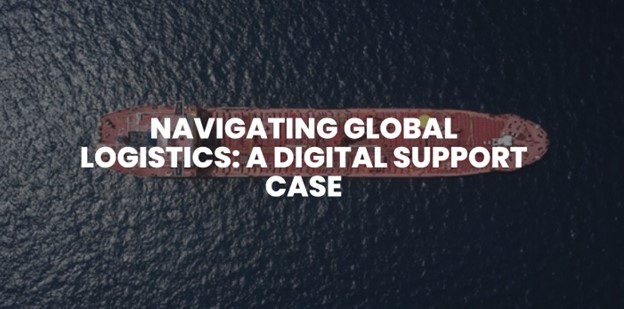12 min to read
Logistics is the heart of any operation that relies on any form of physical good, whether that be receiving or sending out. However, while domestic logistics is enough to cause headaches, dealing with it on a global basis can introduce a whole new level of stress that many nascent businesses are simply unable to navigate. Fortunately, if you find your business slowly drowning in a miasma of worldwide supply chain management, plenty of companies can help you based on your circumstances. Though it may sound simple, it can be challenging to recognize the symptoms of needing assistance, which is why being aware of this is the first step. This article will explore the various moments companies reach out to our client to this companies for help. So what are the main problems logistics companies help with, and when to reach out to one them:

Complex Regulations Hindering Your Operations
Let's face it: the supply chain is a complex beast that has only recently shown signs of recovery after the global pandemic and with copious amounts of help from artificial intelligence. Part of this is the web of regulations that many countries impose based on their laws, alliances, and the worldwide political landscape in general. This is where dedicated companies can really provide help, mainly if they have been in the global logistics industry for a number of years and have seen it evolve over time. According to experts, one 3PL business that has been in operation for over 130 years offers a range of services based on their experience, making them and others in the game for a similar amount of time such valuable commodities. If you try to achieve the same results yourself, you could find your shipments being delayed as each item must be checked multiple times for compliance with each nation's rules for whom you deliver.
Struggling To Meet Tight Deadlines
Failing to understand the intricacies of the global supply chain can seriously jeopardize any business that relies on timely deliveries across borders. This can manifest in either shipping your goods out or importing various commodities to create a finished product. Regardless of which side you are on, a lack of understanding will cause severe delays, which can ultimately damage your brand reputation irreparably. For companies with small margins and demanding customers, even minor hiccups in the supply chain can translate to missed deadlines and damaged customer relationships.

Incurring High Shipping Costs
Oftentimes, the most inexpensive shipping methods on paper involve complex multi-modal routes and long transit times rife with opportunities for delays and additional charges. Novice international shippers opting for these options without visibility into potential issues may find themselves slapped with expensive penalties for missed delivery windows or demurrage fees for late customs clearance. Lack of logistics expertise can also lead to inefficient packing, poor container utilization, and incorrect paperwork, necessitating costly corrections. These excess costs can quickly eat into margins on every shipment. However, the upside is that by partnering with a dedicated logistics company, you can also quickly reduce these costs, dramatically improving your bottom line even when you factor in the additional cost of outsourcing your logistical needs.
Facing Customs Clearance Delays
As we have already established, any form of delay is the antithesis of good business, and customs delays are among the many delays that might result from a lack of knowledge about global logistics. For companies new to international trade, unexpected holdups at this stage are often the result of a lack of expertise in logistics. Paperwork errors or missing documentation will trigger customs inspections that can take days or weeks to complete. An incomplete understanding of classification codes or product restrictions could lead to unexpected duties or even seizure of the shipment. Not being up to speed on free trade agreements in different markets leaves opportunities for duty savings on the table. Tight delivery deadlines may be put at risk by failing to anticipate clearance times at various ports (all of which can be different).
Unable To Track Shipments Efficiently
For any business operating globally, visibility is critical to maintaining control of inventory and meeting customer expectations. However, gaining clear visibility into international shipments is challenging for those without the right tools or expertise. If a business is unable to efficiently view the status and location of all its shipments in transit, it breeds inefficiency and potential issues. Not knowing arrival times increases the risks of stockouts or missed delivery deadlines. Moreover, a lack of end-to-end shipment tracking also makes it difficult to gather data and identify inefficiencies to optimize future routes and costs.
Dealing With Language Barriers
As global trade expands to new markets, language barriers increasingly challenge logistics operations if not adequately addressed. While English dominates international business, local customs and regulations are often only available in other tongues. Miscommunications due to poor translations of shipping documents like bills of lading or commercial invoices open the door for delays or fines from customs authorities. Carriers and forwarders relying on local labor must contend with language gaps that hamper meaningful discussions with drivers and port authorities. A lack of multilingual staff risks paperwork errors that can result in cargo misrouting or lengthy holds for inspection, but the issue is finding and paying for additional staff who can speak other languages. Even small mistakes due to linguistic misunderstandings may endanger fragile, just-in-time supply chains. To avoid such logistical snags, companies must invest in translation services to quickly navigate foreign requirements and solve problems.
Lost In International Trade Jargon
The extensive jargon and acronyms used within the industry can easily confuse outsiders unfamiliar with supply chain nuances. But failing to understand key terms has real implications. Unfamiliarity with customs codes and tariff schedules opens the door for expensive delays (yep, there's that word again!), and misinterpreting transportation documents like bills of lading jeopardizes on-time deliveries. The myriad logistics services involving ocean, air, and truck freight are daunting without context. Getting lost in the sea of unfamiliar terminology hampers efficiency and decision-making. It also makes it difficult to identify problems or improvement opportunities. For those diving into global markets, taking time to learn critical international trade terminology is crucial to streamlining logistics operations from the start.

How can a digital agency help logistics companies be found online?
The Digital Era of Logistics: A Strategic Imperative
In today's digital age, logistics companies face a myriad of challenges, from complex regulations and tight deadlines to high shipping costs and customs clearance delays. The digital landscape offers an unparalleled opportunity for these companies to enhance their visibility, streamline operations, and connect with a broader client base. A digital agency, with its expertise in online marketing and analytics, can be a crucial partner in navigating this landscape.
Leveraging Digital Marketing to Increase Visibility
Search Engine Optimization (SEO): SEO is fundamental for logistics companies to increase their online visibility. A digital agency can optimize a logistics company’s website to rank higher in search engine results for industry-specific keywords. This approach ensures that when potential clients search for logistics services, they find the company easily.

Case Study: SEO Strategy for Maersk - Navigating the Digital Seas
Maersk, a global leader in shipping and logistics, recognized the need to strengthen its online presence to maintain its industry dominance. In a world where digital visibility is crucial, Maersk sought to enhance its SEO strategy to increase organic traffic, improve customer engagement, and ultimately drive business growth.
The primary objective was to optimize Maersk's online presence to:
- Increase organic search traffic.
- Improve search engine rankings for industry-relevant keywords.
- Enhance user experience and engagement on the website.
- Drive conversions in the form of inquiries and service sign-ups.
Strategy
-
Keyword Research and Optimization: Conducting comprehensive keyword research to identify terms and phrases most relevant to Maersk’s services and target audience. This research focused on both high-volume keywords and long-tail phrases to capture a broad spectrum of search intents.
-
On-Page SEO Enhancements: Optimizing website content, including meta tags, headers, and on-page text, to align with targeted keywords. This also involved ensuring content relevance and quality to engage users effectively.
-
Technical SEO Improvements: Addressing technical aspects of the website to improve crawlability and indexation. This included enhancing site speed, mobile-friendliness, and fixing broken links.
-
Content Strategy Development: Creating a robust content strategy to position Maersk as a thought leader. This involved publishing industry insights, shipping updates, and detailed guides to attract and retain a professional audience.
-
Link Building: Implementing a strategic link-building campaign to improve domain authority. This involved acquiring high-quality backlinks from reputable industry-related websites.
Implementation
-
Website Audit and Optimization: Maersk's website underwent a thorough audit to identify and rectify SEO inefficiencies.
-
Enhanced Content Creation: The development of SEO-optimized articles, blog posts, and whitepapers that provided value to Maersk’s audience.
-
User Experience (UX) Focus: Redesigning website elements to improve navigation, load times, and mobile responsiveness.
-
Continuous Monitoring and Adjustments: Utilizing SEO tools to monitor performance and make ongoing adjustments to the strategy.
Results
-
Increased Organic Traffic: Maersk witnessed a significant increase in organic traffic, indicating improved visibility and reach.
-
Higher Search Engine Rankings: Key industry keywords saw improved rankings, with many reaching the top positions on search engine results pages.
-
Enhanced User Engagement: Improved website UX led to increased time spent on the site and lower bounce rates.
-
Conversion Growth: There was a noticeable increase in conversion rates, including inquiries and service sign-ups.
Data
Through a comprehensive and tailored SEO strategy, Maersk successfully improved its online visibility and user engagement. This case study demonstrates the importance of a well-rounded SEO approach, incorporating both on-page and off-page tactics, to drive digital success in the logistics industry.
- Content Marketing: High-quality, informative content is key to engaging potential clients. A digital agency can help create and distribute relevant articles, infographics, and videos that showcase the logistics company's expertise. This content not only improves SEO but also establishes the company as a thought leader in the logistics industry.
-
Social Media Marketing: Social media platforms are powerful tools for reaching and engaging with a global audience. Digital agencies can manage a logistics company's social media presence, creating and sharing content that resonates with their target audience, and fostering community engagement.
-
Pay-Per-Click Advertising (PPC): PPC campaigns can be highly effective for logistics companies looking to target specific markets or services. Digital agencies can create and manage these campaigns, ensuring they reach the right audience and deliver a strong ROI.
-
Email Marketing: By crafting targeted email campaigns, digital agencies can help logistics companies nurture leads and keep their services top-of-mind for potential clients.
Analytics and Data-Driven Decision Making
Data analytics play a crucial role in understanding market trends, customer behavior, and campaign performance. Digital agencies use advanced analytics tools to gather data, which can then be used to refine marketing strategies, optimize operations, and improve customer experiences.

Case Study: Analytics and Data-Driven Decision-Making at Everwest Logistics Company
Everwest Logistics, a mid-sized logistics company, faced challenges in optimizing their operations and customer service. The company recognized the need to leverage analytics and data-driven decision-making to enhance their efficiency and competitiveness in the logistics sector.
The main objectives were to:
- Improve operational efficiency through data analysis.
- Enhance customer satisfaction by better understanding client needs and preferences.
- Increase profitability by identifying cost-saving opportunities.
- Make informed strategic decisions based on actionable insights.
Strategy
-
Implementing Advanced Analytics Tools: Everwest Logistics invested in state-of-the-art analytics tools to process large volumes of operational and customer data.
-
Data Collection and Integration: The company integrated data from various sources, including shipment tracking systems, customer feedback channels, and financial systems, to create a comprehensive data warehouse.
-
Performance Metrics Identification: Key performance indicators (KPIs) were established to measure efficiency, customer satisfaction, and financial health.
-
Predictive Analytics: Utilizing predictive analytics to forecast demand, optimize routes, and anticipate potential disruptions in supply chains.
-
Customer Data Analysis: Analyzing customer feedback and behavior data to understand preferences and improve service offerings.
Implementation
-
Training and Development: Staff were trained to use analytics tools effectively and to interpret data insights.
-
Real-time Dashboard Creation: Development of real-time dashboards for monitoring key metrics and making timely decisions.
-
Process Automation: Automated data collection and analysis processes to reduce manual errors and improve efficiency.
-
Regular Data Review Meetings: Instituted regular meetings for reviewing data insights and making strategic decisions.
Results
-
Operational Efficiency: Everwest Logistics experienced a significant improvement in operational efficiency, with a 20% reduction in transit times and a 15% decrease in logistical errors.
-
Customer Satisfaction: Enhanced service based on customer data led to a 30% increase in customer satisfaction scores.
-
Cost Reduction: Data-driven route optimization and operational adjustments resulted in a 25% reduction in operational costs.
-
Informed Decision Making: Strategic decisions made based on data insights led to improved market positioning and business growth.
The Role of AI in Digital Marketing for Logistics
Artificial Intelligence (AI) is revolutionizing digital marketing for logistics companies. AI-driven tools can analyze large data sets to identify patterns and insights, enabling more personalized and effective marketing strategies. AI can optimize logistics operations by predicting market trends, automating customer interactions through chatbots, and providing advanced analytics for better decision-making.
The Importance of a Strong Online Presence
In a sector as competitive as logistics, a strong online presence is not just beneficial; it's essential. A digital agency can help logistics companies stand out in a crowded market, attract more leads, and convert those leads into loyal customers. By leveraging the power of digital marketing, logistics companies can stay ahead of the curve and navigate the complexities of the global market more effectively. The top logistics companies globally have embraced digital transformation, not only in their operations but also in how they present themselves online. This benchmark analysis explores the strategies of leading logistics firms in maintaining robust online presences and why it's crucial for success in the industry.
Benchmarking Top Logistics Companies
DHL: DHL has a comprehensive digital strategy encompassing an interactive website, a strong social media presence, and effective use of digital marketing techniques. Their website ranks highly for key logistics keywords, and they actively engage with customers through social media and online resources. DHL's investment in digital technologies like AI and machine learning for their operational processes also reflects on their online customer interfaces, offering enhanced user experiences and efficient service delivery.
Maersk: Maersk's digital presence is marked by a highly informative and user-friendly website. They leverage SEO effectively to rank for essential industry keywords. Maersk also utilizes content marketing to establish thought leadership, publishing regular insights on market trends and shipping innovations. Their online customer service platforms are integrated with advanced analytics, improving customer engagement and satisfaction.
FedEx: FedEx has a robust online presence characterized by a dynamic website and active social media engagement. They use digital channels not only for marketing and customer engagement but also for providing innovative solutions like real-time tracking and customized logistics services. FedEx's online tools and applications demonstrate their commitment to digital innovation.
UPS: UPS showcases a strong online presence with a focus on user experience and digital solutions. Their website is optimized for SEO, ensuring high visibility in search engine results. UPS has also invested in mobile technology, recognizing the importance of mobile accessibility for their business clients.
C.H. Robinson: As a major logistics and supply chain solutions provider, C.H. Robinson emphasizes digital innovation in its online presence. Their website and digital platforms offer advanced tools for freight quotes, tracking, and supply chain management, reflecting their commitment to leveraging technology to improve customer experiences.
Importance of a Strong Online Presence
- Visibility and Brand Awareness: In the digital age, customers often start their search for logistics services online. A strong online presence ensures that a company is easily discoverable, enhancing brand awareness and reach.
- Customer Engagement and Service: An effective online presence allows for better customer engagement through tools like live chat, AI-driven customer service, and real-time tracking. This leads to improved customer satisfaction and loyalty.
-
Operational Efficiency: Integrating digital tools on online platforms can streamline operations, from order booking to tracking and customer feedback management.
-
Market Positioning and Thought Leadership: A strong online presence, especially through content marketing and social media, helps logistics companies establish themselves as thought leaders, influencing industry trends and standards.
-
Adaptability to Market Changes: Companies with a strong digital presence can quickly adapt to market changes, leveraging online data and feedback to make informed decisions.

How Codedesign Can Elevate Logistics Companies' Digital Strategies
Codedesign, as a specialized digital marketing agency, offers a comprehensive suite of services tailored to the unique needs of logistics companies. By leveraging our expertise in digital marketing, analytics, and technology, we can help logistics businesses enhance their online presence, streamline operations, and engage more effectively with their customers.
Developing a Robust Digital Marketing Strategy
- SEO and Content Marketing: Codedesign can optimize your website to improve search engine rankings, driving more organic traffic. Our content marketing strategies involve creating high-quality, industry-relevant content that establishes your company as a thought leader in logistics.
- PPC and Social Media Advertising: We design targeted pay-per-click and social media advertising campaigns to reach your specific audience effectively, increasing brand awareness and generating leads.
Implementing Advanced Analytics Solutions
- Data Analytics Integration: Our team can integrate advanced analytics tools into your operational systems, enabling you to harness the power of your data. This integration leads to better decision-making, optimized operations, and a deeper understanding of customer behavior.
- Performance Monitoring: We provide ongoing monitoring and analysis of key performance indicators, helping you continually refine and improve your strategies.
Enhancing User Experience and Website Optimization
- Website Design and Optimization: Codedesign specializes in creating user-friendly, mobile-responsive websites that reflect the professionalism and efficiency of your logistics services.
- Conversion Rate Optimization (CRO): We employ CRO techniques to turn website visitors into leads and customers, optimizing every aspect of the user journey.
Leveraging AI for Predictive Insights and Personalization
- AI-Driven Marketing: We use AI tools to analyze customer data, predict market trends, and personalize marketing efforts. This approach results in more effective campaigns and improved customer engagement.
Custom Solutions for Unique Business Challenges
- Tailored Strategies: Understanding that each logistics company has unique challenges and goals, Codedesign offers customized digital solutions to meet your specific needs.
Expanding Global Reach and Multilingual Marketing
- International SEO and Marketing: For logistics companies with a global footprint, we provide international SEO and multilingual marketing services to effectively reach diverse markets.

About Bruno GavinoBruno Gavino is the CEO and partner of Codedesign, a digital marketing agency with a strong international presence. Based in Lisbon, Portugal, with offices in Boston, Singapore, and Manchester (UK) Codedesign has been recognized as one of the top interactive agencies and eCommerce agencies. Awarded Top B2B Company in Europe and Top B2C company in retail, Codedesign aims to foster personal relationships with clients and create a positive work environment for its team. He emphasizes the need for digital agencies to focus on data optimization and performance to meet the increasingly results-driven demands of clients. His experience in digital marketing, combined with a unique background that includes engineering and data, contributes to his effective and multifaceted leadership style. |

About CodedesignCodedesign is a digital marketing agency with a strong multicultural and international presence, offering expert services in digital marketing. Our digital agency in Lisbon, Boston, and Manchester enables us to provide market-ready strategies that suit a wide range of clients across the globe (both B2B and B2C). We specialize in creating impactful online experiences, focusing on making your digital presence strong and efficient. Our approach is straightforward and effective, ensuring that every client receives a personalized service that truly meets their needs. Our digital agency is committed to using the latest data and technology to help your business stand out. Whether you're looking to increase your online visibility, connect better with your audience, get more leads, or grow your online sales. For more information, read our Digital Strategy Blog or to start your journey with us, please feel free to contact us. |
CodeDesign is leading:
- Digital Agency
- Digital Marketing Agency
- Digital Ecommerce Agency
- Amazon Marketing Agency


Add comment ×